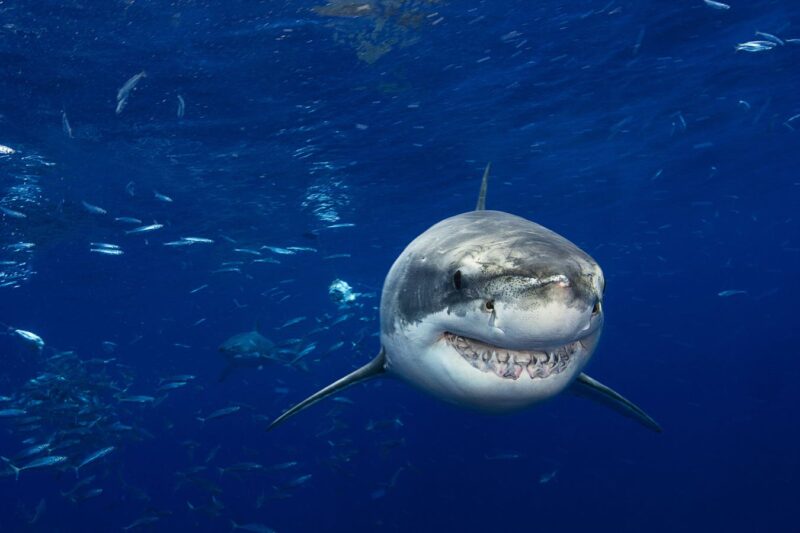Australia’s rare moment of national unity could serve as a blueprint for a more honest and balanced global conversation about sharks: one where coexistence, not control, becomes the standard. (Photo by: Dave Fleetham/Design Pics Editorial/Universal Images Group via Getty Images)
Design Pics Editorial/Universal Images Group via Getty Images
Imagine getting nearly every person in a country to agree on one thing. Seems impossible in a country where political divides, sporting rivalries and even debates about coffee can spark fierce disagreement. Yet a new YouGov survey has revealed striking unity amongst Australians on an issue that has long captured headlines: shark attacks. An overwhelming 85 percent of Australians said they do not believe governments can make beaches “100 percent safe” from sharks.
And this result cuts across party lines and geography! Among those who identified with Labor, 79 percent said shark-proofing beaches was impossible. The number jumped to 87 percent for Coalition (Liberal) voters and 93 percent for Greens. Even more remarkable, the sentiment was consistent across coastal states; from New South Wales (83 percent) to Queensland (88 percent), Western Australia (81 percent) and South Australia (87 percent), Australians appear to share the common understanding that the ocean is the ocean, and humans cannot tame it entirely. For Associate Professor Chris Pepin-Neff, who led the study at the University of Sydney, these findings represent extraordinary consensus. “There has never been a more conclusive survey about Australia’s relationship to sharks and the ocean,” he explained in an e-mailed press release. “For 85 percent of Australians across all parties and states to agree on anything is extraordinary, but when it comes to sharks, Australians understand that […] you cannot shark-proof Australia.”
Pepin-Neff alludes that the timing of the survey was deliberate. Conducted from September 25 to 30, it coincided with the start of the beach season and the annual deployment of shark nets along the New South Wales coast. The research is also contextualized by ongoing political debates around shark bite mitigation strategies. Governments in Australia continue to invest heavily in programs designed to reduce the risk of shark attacks; for example, New South Wales spends about $21 million each year, while Queensland will pour “an additional $88.228 million into the Shark Control Management Plan 2025-2029,” as reported by the Queensland Government in a media statement in May 2025. Nationally, that means more than $150 million is projected to go toward nets, drumlines, drones and other measures over the next four years. But with these new survey results, it raises some important questions about whether such spending aligns with public understanding. If most Australians already recognize that the ocean cannot be made completely safe, are governments overselling their ability to deliver security? Dr Pepin-Neff argues yes, warning that political promises of “zero risk” are misleading. “Premiers are treating the ocean like it’s a zero-risk proposition where they can be ‘tough on sharks’ to win votes,” he said. “This is misleading. It is the choices that swimmers and surfers make — not government programs — that will improve safety in the ocean.”
This echoes earlier research showing that Australians generally do not blame governments for shark attacks. Instead, there is broad recognition that anyone entering the water does so at their own risk and many people have indicated they would continue visiting beaches even if shark nets were removed. That kind of resilience highlights how deeply coastal culture is woven into Australian identity. The reality, of course, is that shark attacks remain rare. Statistically, the chances of being bitten are vanishingly small compared to other risks in daily life (instead, you should cast a wary eye on vending machines or people from New York). Yet every bite, fatal or not, captures national attention, often accompanied by political statements and calls for tougher measures. For families and communities affected by attacks, the impact is profound and tragic. (The researcher team were careful to note that their work was not connected to the recent fatal shark attack at Dee Why Beach, which claimed the life of Mercury Psillakis. They extended condolences to his family and the local surfing community.)
When it comes to shark mitigation, the tension lies between perception and reality. Nets and drumlines are often presented as safety solutions, but they are far from foolproof. Nets, for example, do not create physical barriers that keep sharks out. Instead, they are designed to entangle sharks, though they frequently catch non-target species such as turtles, dolphins and rays. Drones and tagging programs provide more real-time monitoring, yet no technology can guarantee protection due to the challenges that come with technology (such as bad weather, visibility, battery life, etc.). As the survey shows, Australians seem to understand this and appears to be rejecting is the idea that the ocean can be controlled like a swimming pool. The sea is a wild and dynamic environment, and sharks play an essential role in its health. Attempts to manage them through lethal or overly simplistic methods often create ecological ripple effects. Removing large predators can destabilize food webs, leading to declines in fish stocks and changes in reef systems. The recognition that sharks cannot be eliminated or fully contained suggests a growing acceptance that coexistence, rather than conquest, is the only realistic path forward.
SYDNEY, AUSTRALIA – MARCH 01: A man walks on the closed Avalon beach after a shark attack on a surfer on March 1, 2009 in Sydney, Australia. The shark attack was the third in as many weeks in Sydney waters, following previous attacks on a surfer at Bondi Beach and a Navy diver in Sydney Harbour. (Photo by Ian Waldie/Getty Images)
Getty Images
Could the results of this survey be something that carries lessons beyond Australia’s shores? Countries like South Africa, the United States, Brazil and island nations in the Indian Ocean also grapple with shark encounters and the political pressure to guarantee ocean user safety. Yet the Australian experience suggests that the public may be more pragmatic than politicians give them credit for, so rather than demanding the impossible promise of “100 percent safe” beaches, people may already recognize that the ocean comes with inherent risk. If that is the case elsewhere, governments could shift focus from costly, lethal programs toward smarter investments in public education, non-lethal technology and conservation. Australia’s rare moment of national unity could serve as a blueprint for a more honest and balanced global conversation about sharks: one where coexistence, not control, becomes the standard.
This may also signal a shift in how shark safety is communicated. For decades, much of the public messaging has leaned on reassurance — There are nets in the water! Helicopters in the sky! Patrol boats on standby! — implying that governments can deliver complete safety. But there is an opportunity here to recalibrate that conversation toward empowerment rather than false guarantees, since Australians already understand that the ocean can never be made risk-free. Instead of framing programs as ways to eliminate risk, policymakers could emphasize risk reduction and personal responsibility. Practical advice (e.g., such as avoiding swimming at dawn or dusk when sharks are most active, steering clear of areas where baitfish or marine mammals are schooling, paying close attention to beach signage and shark alerts) provides a much clearer and more honest picture of how to stay safe. These strategies not only put decision-making power back into the hands of beachgoers but align with the reality that most shark bite incidents occur when multiple risk factors overlap, not because mitigation programs fail. It may also turn attention toward improving public education campaigns; just as beach safety is now understood as a skill to learn, shark safety could be normalized in a similar way.
Ultimately, Australians are clear-eyed about the ocean: it is not a space that can be controlled, and sharks are not villains to be eradicated. The challenge now lies with policymakers to match that public understanding with honest communication and balanced investments. Pretending the sea can be made risk-free may win short-term political points, but it does little to prepare people for the realities of sharing the water with sharks.
The message from the survey is unmistakable. Australians know the risks, accept them, and continue to embrace the ocean as part of their identity. You cannot shark-proof Australia… and it seems most Australians would not want to anyway.









